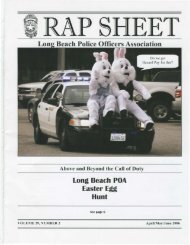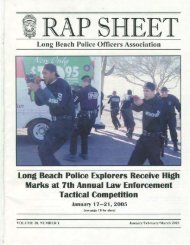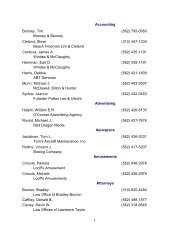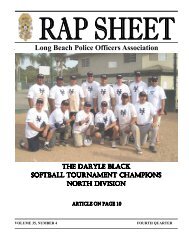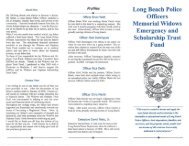JUL/AUG/SEP - Long Beach Police Officers Association
JUL/AUG/SEP - Long Beach Police Officers Association
JUL/AUG/SEP - Long Beach Police Officers Association
You also want an ePaper? Increase the reach of your titles
YUMPU automatically turns print PDFs into web optimized ePapers that Google loves.
educational categories (less than<br />
high school, high school<br />
diploma, some college, college<br />
degree, etc), they found that<br />
Michigan employees earned less<br />
within every educational category.<br />
This is the fallacy known<br />
as Simpson’s Paradox.<br />
The Michigan study determined<br />
that the average state worker<br />
appeared to earn more only<br />
because the state hired more of<br />
those in the highly trained and<br />
educated categories, not because<br />
workers with the same education<br />
and training earned more in the<br />
public sector.<br />
The Bender/Heywood study concluded,<br />
in part, “State and local<br />
governments consist disproportionately<br />
of occupations that<br />
demand more skills and earn<br />
higher wages. As a consequence,<br />
the typical state or local<br />
government employee has<br />
substantially more education,<br />
training, and experience. Adjusting<br />
for these differences…<br />
explains most of the observed<br />
earnings advantage of the typical<br />
state and local worker.”<br />
Their study revealed that public<br />
sector employees are more than<br />
twice as likely to have at least a<br />
bachelor’s degree. This disparity<br />
in education and training<br />
will account for the overall better<br />
compensation of the public<br />
sector worker. When you accurately<br />
compare the two workers,<br />
it becomes clear that the<br />
greater education and training<br />
demanded by the public sector<br />
position requires more compensation.<br />
The fact that the average private<br />
sector employee earns<br />
more compensation than the<br />
comparable public employee<br />
holds true even after adding<br />
benefits such as pension and<br />
insurance.<br />
The study indicated that<br />
citizens should expect higher<br />
public service benefits because<br />
a more educated and trained<br />
employee should have greater<br />
benefits. Even in the private<br />
sector, benefits are greater for<br />
the more educated. Since the<br />
public sector “consists disproportionately<br />
of the educated,<br />
we would expect the average<br />
level of benefits to be higher in<br />
the public sector.” However,<br />
even after adding benefits, the<br />
equally trained and educated<br />
public employees still lag<br />
behind their private sector counterpart<br />
by 6.8-10.4 percent.<br />
The economic recession has hurt<br />
both the private and public sector.<br />
Everybody, including the<br />
public sector worker, has obviously<br />
made sacrifices; however, I<br />
would request prudence when<br />
moving forward. Crisis often<br />
leads people to search for scapegoats<br />
and miraculous panaceas.<br />
Some are trying to blame the current<br />
government finance problems<br />
on public worker pay and<br />
pensions. The cure to the ill is<br />
sold as “bringing public sector<br />
compensation ‘in line’ with<br />
private sector wages.”<br />
This study revealed that the longterm<br />
patterns indicate public<br />
worker compensation is not<br />
excessive. It found that “public<br />
sector workers earn more on<br />
average than private sector workers,<br />
but less than they would<br />
earn if they took their skills to<br />
the private sector.” As much as<br />
the hype and hysteria in the<br />
media, political, and public<br />
forums would like to make you<br />
believe that public employees are<br />
overcompensated; when properly<br />
compared to the private sector<br />
employee, public employees are<br />
a bargain.<br />
GREG AND LAURIE MANIS, REALTORS<br />
(562)972-4382 OR (562)822-4382<br />
LLMANIS@MSN.COM<br />
DRE LIC #’S 01274067, 01478187<br />
A Dedicated <strong>Long</strong> <strong>Beach</strong> <strong>Police</strong> Officer For 23Years<br />
Married For 25 Years With Two Wonderful Sons<br />
As A Team We Can Help You<br />
With All Your Real Estate Needs!<br />
Editor’s Note: As of July 6,<br />
2010, the <strong>Long</strong> <strong>Beach</strong> <strong>Police</strong><br />
Department had 910 sworn<br />
employees, and 489 of those<br />
officers had some kind of college<br />
degree (53.7 percent). The<br />
breakout is: 134 with an associate’s<br />
degree, 274 with a bachelor’s<br />
degree, 80 with a master’s<br />
degree, and 1 with a doctorate.<br />
The LBPOA encourages all of our<br />
members to continue their<br />
advanced education studies.<br />
RAP SHEET 23



